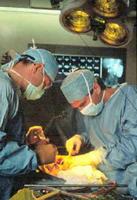 Non-cardiac surgery has a low overall mortality but is associated with a large number of deaths because so many procedures are performed (250 million major surgical procedures worldwide per year).
Non-cardiac surgery has a low overall mortality but is associated with a large number of deaths because so many procedures are performed (250 million major surgical procedures worldwide per year).Assuming a hospital mortality rate of 1%, non-cardiac surgery will be associated with 2.5 million deaths worldwide each year and complication rates at least five times this figure.
15% of people who undergo inpatient surgery are at high risk of complications, such as pneumonia or myocardial infarction.
Most deaths occur in a group of patients who are at high risk because of:
- advanced age
- comorbid disease
- major surgery
High risk surgical patients account for 80% of all perioperative deaths.
Further research is needed to identify the most effective approaches to perioperative medicine for high risk patients.
References:
Managing perioperative risk in patients undergoing elective non-cardiac surgery. BMJ 2011; 343 doi: 10.1136/bmj.d5759 (Published 5 October 2011), Cite this as: BMJ 2011;343:d5759
Image source: Wikipedia